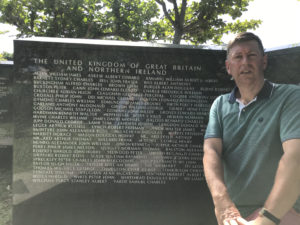4th December 2020 Tokyo, Japan
Okinawa – Japan’s sub-tropical island chain
 The Japanese archipelago stretches around 2,000 miles from north to south. The Ryukyu chain in the far southwest, which includes the Okinawa group of islands, is almost tropical. It used to be a separate kingdom, a key part of the trading routes with East and South East Asia. Many ancient fortified palaces from that period remain. But it has been effectively controlled by Japan since the early 17th century.
The Japanese archipelago stretches around 2,000 miles from north to south. The Ryukyu chain in the far southwest, which includes the Okinawa group of islands, is almost tropical. It used to be a separate kingdom, a key part of the trading routes with East and South East Asia. Many ancient fortified palaces from that period remain. But it has been effectively controlled by Japan since the early 17th century.
For many in the West, Okinawa is best known as the site of the bloody three month Battle of Okinawa fought in the closing stages of the second world war, at enormous cost. Around 20,000 US marines and soldiers perished, and some 110,000 Japanese military, including 40,000 conscripted Okinawan civilians. The effect on the local civilian population was a particularly huge tragedy, with perhaps a quarter of the 300,000 population losing their lives, many by suicide, including coerced suicides.
 I visited the sobering Peace Memorial Park , which tells the story of the battle and Okinawa’s subsequent history. The fallen soldiers of all different nationalities are honoured, with their names engraved on a memorial in the beautiful grounds. I paid my respects at a memorial to the small number of British troops who also lost their lives in the battle. Not far away is another museum about the Himeyuri students, a nursing corps comprised of local high school girls, most of whom lost their lives. It gives the tragedy a very personal feel.
I visited the sobering Peace Memorial Park , which tells the story of the battle and Okinawa’s subsequent history. The fallen soldiers of all different nationalities are honoured, with their names engraved on a memorial in the beautiful grounds. I paid my respects at a memorial to the small number of British troops who also lost their lives in the battle. Not far away is another museum about the Himeyuri students, a nursing corps comprised of local high school girls, most of whom lost their lives. It gives the tragedy a very personal feel.
Although the post War US Occupation of Japan ended in 1952, Okinawa only reverted to Japanese control in 1972. And to this day it remains a vital part of the US contribution to regional peace and security, as home to some 30,000 of the 40,000 US troops permanently based in Japan. Together with my Defence Advisor, Capt Simon Staley RN, I called on the heads of the US Marine Corps, Airforce and Navy on their impressive bases to discuss regional security. They welcomed growing British engagement in Indo Pacific. Not surprisingly, having such a large concentration of foreign military housed adjacent to civilian populations can give rise to some tensions. I had the opportunity to hear about this from Prefectural Governor Denny Tamaki.

Of course, Okinawa is not just about the military. It is also a very popular tourist destination for many Japanese and foreign visitors, with beautiful beaches and a sunny climate. Even in late November it was warm. It was sad to hear about the impact of the COVID crisis on the islands’ economy this year. With my visit to Okinawa I have now visited all 47 of Japan’s prefectures over the last four years. I have come to treasure Japan’s profoundly rich and varied geography.